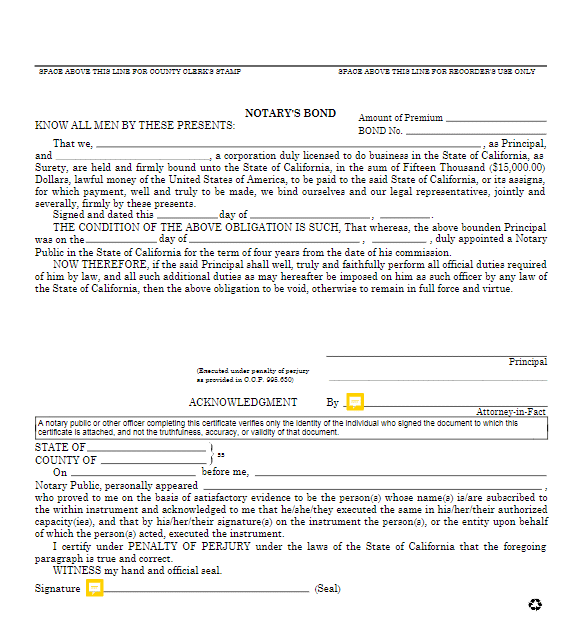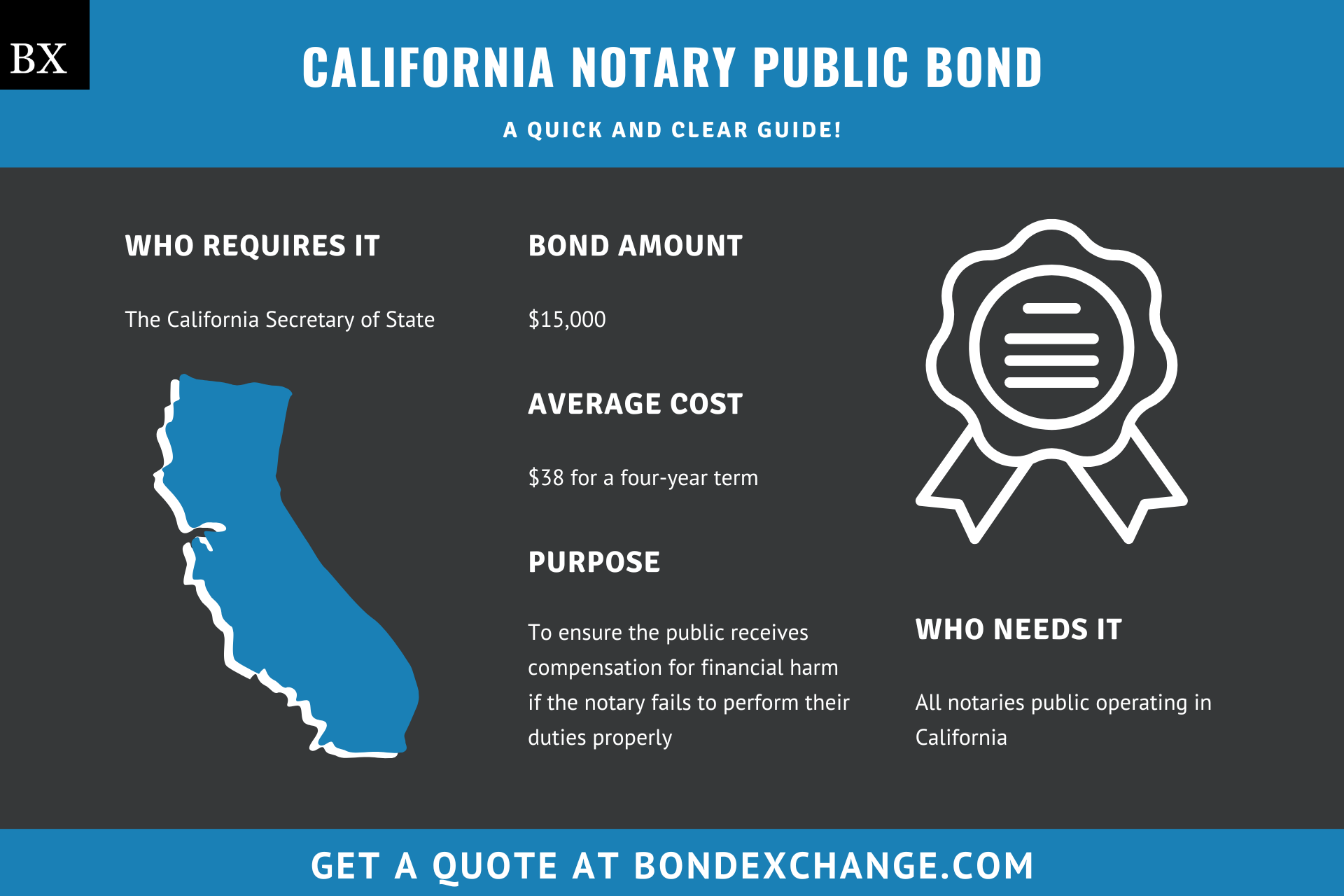California Notary Public Bond: A Comprehensive Guide
This guide provides information for insurance agents to help their customers obtain a California Notary Public bond
At a Glance:
- Average Cost: $38 for a four-year term
- Bond Amount: $15,000
- Who Needs it: All notaries public operating in California
- Purpose: To ensure the public receives compensation for financial harm if the notary fails to properly perform their duties
- Who Regulates Notaries Public in California: The California Secretary of State

Background
California Government Code 8200 requires all notaries operating in the state to obtain a commission from the Secretary of State before performing notarial acts. The California legislature enacted this requirement to ensure that notaries engage in ethical business practices. To provide financial security for the enforcement of the commission requirement, notaries must purchase and maintain a $15,000 surety bond to be eligible for a commission.
What is the Purpose of the California Notary Public Bond?
California requires notaries to purchase a surety bond as a prerequisite to obtaining a notary commission. The bond protects the public from financial harm if the notary fails to comply with the regulations outlined in California Government Code 8214. Specifically, the bond protects the public if the notary signs any documents for persons committing fraud, does not actually witness the signatures on documents being notarized, or fails to maintain an accurate record of all notarial acts. In short, the bond is a type of insurance that protects the public if the notary violates the terms of their commission.
How Can an Insurance Agent Obtain a California Notary Public Surety Bond?
BondExchange makes obtaining a California Notary Public bond easy. Simply log in to your account and use our keyword search to find the “Notary” bond in our database. Don’t have a login? Gain access now and let us help you satisfy your customers’ needs. Our friendly underwriting staff is available by phone at (800) 438-1162, email, or chat from 7:30 AM to 7:00 PM EST to assist you.
At BondExchange, our 40 years of experience, leading technology, and access to markets ensures that we have the knowledge and resources to provide your clients with fast and friendly service whether obtaining quotes or issuing bonds.
Not an agent? Then let us pair you with one!
Click the above image to find a BX Agent near you
Is a Credit Check Required for the California Notary Public Bond?
No, a credit check is not required for the California Notary Public bond. Because the bond is considered relatively low risk, the same low rate is offered to all notaries in the state regardless of their credit history.
How Much Does the California Notary Public Bond Cost?
The California Notary Public bond costs just $38 for a four-year term.
Who is Required to Purchase the California Notary Bond?
California requires notaries public to purchase a surety bond as a prerequisite to obtaining a notary commission. To paraphrase the California Notary Public Handbook, a notary public is a public official who serves as an impartial witness to the signing of legal documents within legal, business, financial, and real estate communities.

BondExchange now offers monthly pay-as-you-go subscriptions for surety bonds. Your customers are able to purchase their bonds on a monthly basis and cancel them anytime. Learn more here.
How Do Notaries Apply for a Commission in California?
Notaries public in California must navigate several steps to obtain a commission. Below are the general guidelines, but applicants should refer to the Secretary of State’s website and the Notary Public Handbook for details on the process.
Commission Term: All California Notary Public Commissions are valid for four years from the date of issuance.
Step 1 – Meet the Qualifications
To be eligible to apply for a notary public commission, applicants must meet all of the following criteria:
-
- Be at least 18 years old
- Be a California resident
Step 2 – Complete an Approved Course of Study
Notaries public must complete a six-hour course of study approved by the Secretary of State prior to being appointed. After successfully completing a course of study, the notary will receive a Proof of Completion certificate which will be used to gain access to the exam.
An approved three-hour refresher course is permitted for current notaries that apply for reappointment before their current commission expires.
Step 3 – Complete the Application
Notaries public must complete the application prior to taking the written examination. The application consists of the applicant’s personal information, professional history, and criminal history. Notaries must submit a printed copy of their application on the day of the exam.
Step 4 – Take the Exam
Notaries are eligible to register for the exam after completing their commission application. Notaries can register for the exam online here or call CPS HR Consulting. Applicants should review study materials found on the Secretary of State’s website and bring the following items with them to the exam:
-
- A current photo identification
- A complete Notary Public Application Form
- A 2” x 2” color passport photo
- Registration Confirmation Letter
- Proof of Completion certificate from the approved education course
- $40 exam and application processing fee by check or money order
Exam results will be mailed to the notary after 15 business days from the exam date. Notaries that pass the exam (70% or higher) will have their applications transmitted to the Secretary of State for processing.
Step 5 – Complete a Background Check
After passing the exam, notaries must undergo a background check and can do so by submitting a set of classifiable fingerprints to Live Scan within one year of their exam date. The fingerprints will be processed by the Department of Justice and the Federal Bureau of Investigation for any criminal history. Applicants must bring the following to the Live Scan site:
-
- A completed Request for Live Scan Service form
- A current photo identification
- A fingerprint processing fee
After passing the background check, notaries will receive a commission packet with all necessary materials and instructions on how to file their commission certificate.
Step 6 – Purchase a Surety Bond
Notaries must purchase and maintain a $15,000 surety bond.
Step 7 – File the Required Items with the County Clerk
Before their commission is valid, notaries public must file an oath of office and surety bond with the clerk’s office in the county the notary conducts business. The filing must be completed within 30 days from the commencement of the commission. Notaries may file the oath and bond by mail, however, it is recommended to submit in person to guarantee timely filing.
How do California Notaries Renew Their Commissions?
Notaries must apply for a new commission before their existing one expires, as there is no specific renewal process. Active notaries with a current commission are only required to complete a three-hour continuing education course of study as opposed to a six-hour course. Notaries are encouraged to start the reappointment process at least six months prior to their current commission’s expiration to avoid a break in terms. All California Notary Public Commissions are valid for four years from the date of issuance.
What are the Insurance Requirements for California Notaries?
California does not require notaries to purchase any form of liability insurance as a prerequisite to obtaining a commission. Notaries public must purchase and maintain a $5,000 surety bond.
How Do California Notaries File Their Bonds?
Notaries public should submit their completed bond forms, including the power of attorney, to the clerk’s office in the county where their place of business is located.
The bond requires signatures from both the surety company that issues the bond and the notary. The surety company should include the following information on the bond form:
- Legal name of the entity/individual(s) buying the bond
- Surety company’s name
- Date the notary was appointed
- Date the bond is signed
What Can California Notaries Do to Avoid Claims Against Their Bonds?
To avoid claims on their bonds, notaries public in California must follow all state regulations, including some of the most important issues below that tend to cause claims:
- Do not leave any notary supplies (seal and journal) in a place where they can be easily stolen
- Do not perform notary services for entities/individuals who are engaged in acts of fraud
- Ensure that the signers of documents are who they say they are and are not misrepresenting themselves
- Witness the signatures of all documents being notarized
- Record all transactions in a notary journal
What Other Insurance Products Can Agents Offer Notaries in California?
California does not require notaries to obtain any form of liability insurance. However, many notaries will consider obtaining errors and omission (E&O) insurance. Bonds are our only business at BondExchange, so we do not issue liability insurance, but our agents often utilize brokers for this specific line of business. A list of brokers in this space can be found here.
How Can Insurance Agents Prospect for California Notary Customers?
California conveniently provides a public database of commissioned notaries operating in the state. Contact BondExchange for additional marketing resources. Agents can also leverage our print-mail relationships for discounted mailing services.
What Other States Require Notary Bonds?
29 states and the District of Columbia require notaries to obtain a Notary Bond as a prerequisite to obtaining a commission. Insurance agents should utilize our Main Notary Bond Page for a detailed analysis of the Notary Bond requirements nationwide.

